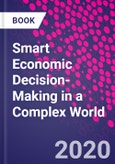Smart Economic Decision-Making in a Complex World is a fresh and reality-based perspective on decision-making with significant implications for analysis, self-understanding and policy. The book examines the conditions under which smart people generate outcomes that improve their place of work, their household and society. Within this work, the curious reader will find interesting open questions on many fascinating areas of current economic debate, including, the role of realistic assumptions robust model building, understanding how and when non-neoclassical behavior is best practice, why the assumption of smart decision-makers is best to understand and explain our economies and societies, and under what conditions individuals can make the best possible choices for themselves and society at large.
Additional sections cover when and how efficiency is achieved, why inefficiencies can persist, when and how consumer welfare is maximized, and what benchmarks should be used to determine efficiency and rationality.
Please Note: This is an On Demand product, delivery may take up to 11 working days after payment has been received.








